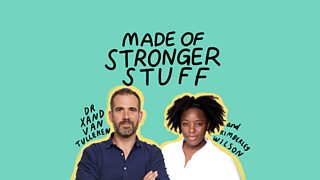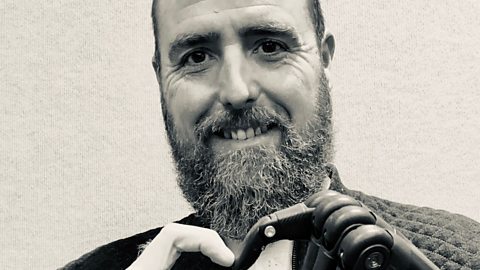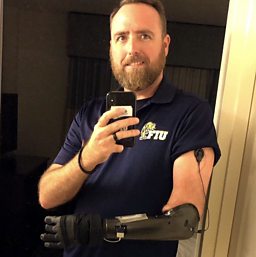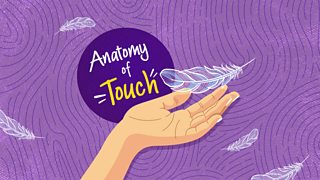A prosthetic hand restored my sense of touch
Jason Little remembers feeling his wife’s hand in his left hand for the first time in seven years. There wasn’t a dry eye in the room as a team of scientists crowded around the couple.
In Made of Stronger Stuff, writes Emily Finch, psychologist Kimberley Wilson and doctor Xand van Tulleken learn how Jason became the first person in the world with a neural enabled prosthetic hand, and as a result, regained the sensation of touch in his fingers.
Made of Stronger Stuff

Psychologist Kimberley Wilson and Dr Xand van Tulleken continue their journey around the human body and put their hands together for… the hands! Listen now.
The collision in the rain
In May 2011, Jason lost control of his vehicle while he was driving his wife home from work. In Florida, where Jason is from, tropical downpours are common in the spring and summer months.
Witnesses would later describe seeing the car roll six or seven times before it came to a stop.
“There was so much water on the road so quickly, that the speed at which we were going ended up being too fast for the conditions,” recalls Jason. Their car started to rotate in the middle of the busy highway and eventually shot across three lanes before smashing into a concrete barrier. Witnesses would later describe seeing the car roll six or seven times before it came to a stop. Jason’s wife was able to escape from the car while he remained trapped, his left arm pinned underneath the wreckage. He had to be freed by paramedics who rushed him to the nearest hospital where he underwent multiple surgeries – the first was to remove his left arm.
A different kind of life
Jason was discharged from hospital after just five days but his life was changed forever. All of the things he might not be able to enjoy in the future rushed through his mind: “I may not be able to ride motorcycles or play ball with a future child.” By day, Jason works as a specialist estate agent but by night he is a DJ and producer, pumping out electronic dance beats. He worried that he might not be able to produce music any more or change records for his audience.
There were also the phantom limb sensations to deal with. These sensations are not imaginary because while the limb may be gone, the nerve endings are still there. “The phantom pain at the beginning was quite severe. There were quite a few times I experienced what I can only describe as electrical jolts as my body recovered and adapted to no longer having a hand. And over time, as the wounds healed and as my body healed, those sensations became less and less painful,” says Jason.

My life-changing prosthetic hand
Jason Little: The world's first recipient of a neural enabled prosthetic hand.
The first in the world
A research team led by Dr Ranu Jung from Florida International University approached Jason in 2017 to ask if he would be part of their study. They had developed a prosthetic hand system which could "feel" again and Jason appeared to be their perfect candidate. He agreed to be part of the study, wanting to leave a “mark” on scientific progress and potentially help thousands of people in the future. The system has multiple parts: sensors in the prosthetic hand, implants under the skin which processes the information from the sensors and a series of fine wires placed inside the nerves above his amputation which sends signals between the brain and prosthetic hand. It’s a complicated system which took researchers ten years to develop.
It was like reaching back in time and making contact with my hand that I no longer had.
“When I touch an object, I get a little tiny tingling, a little buzzing, if you will, in that part of my phantom limb. The two sensors are being picked up in a part of my body that is no longer there,” says Jason.
He faced a series of tests after a five-hour operation to transfer the system into his body. But eventually, Jason was allowed to hold his wife’s hand in his left hand for the first time in seven years. “I slowly closed the prosthetic hand and with my eyes closed, I was able to receive the sensation that I was making contact. And the realisation that I was making contact with my wife's hand was a really, really powerful moment,” he recalls.
“It was like reaching back in time and making contact with my hand that I no longer had,” said Jason.
The water bottle
Thanks to the new prosthetic hand and the return of sensory feedback, Jason says his confidence has rocketed.
“The independence that you get back, the confidence that you get back. It's just really been a game changer,” he says. Now, Jason is able to grab items without dropping them, knowing exactly what pressure to apply to his prosthetic hand. He says his biggest achievement is being able to open a bottle of water with his hands where before he’d have to rely on his teeth. “One of the first things I did in the lab was open a bottle without spilling it. And it just felt like such an accomplishment to me after spending the last seven years struggling with such a simple task,” he says.
It’ll be some years before similar prosthetics which "feel" will be widely available to the general public but Jason is already coming up with improvements: “I would love to see sensors in each of the fingers and also a temperature sensor. But, this being version 1.0, we're going to have some challenges and we're going to have some opportunity for advancements later.”

You can hear Jason Little's story in "The Hands" episode of Made of Stronger Stuff, available on Βι¶ΉΤΌΕΔ Sounds.
We think you'll also like...
-
![]()
The Anatomy of Touch
What does touch mean to us and how has the need for touch changed because of Covid-19? Claudia Hammond reveals the Βι¶ΉΤΌΕΔ Touch Test results.
-
![]()
Art of Now
Hands: In conversation with artists as they create their work, psychotherapist Philippa Perry explores what our hands tell us about our world and about ourselves.
-
![]()
Infinite Monkey Cage
How to Build a Bionic Human: Brian Cox and Robin Ince are joined by "supervet" Noel Fitzpatrick, Dr Kevin Fong and comedian Lucy Beaumont to learn how to build a bionic human.
-
![]()
The Senses
Neurologist Guy Leschziner explores the surprisingly strange world of our senses.




